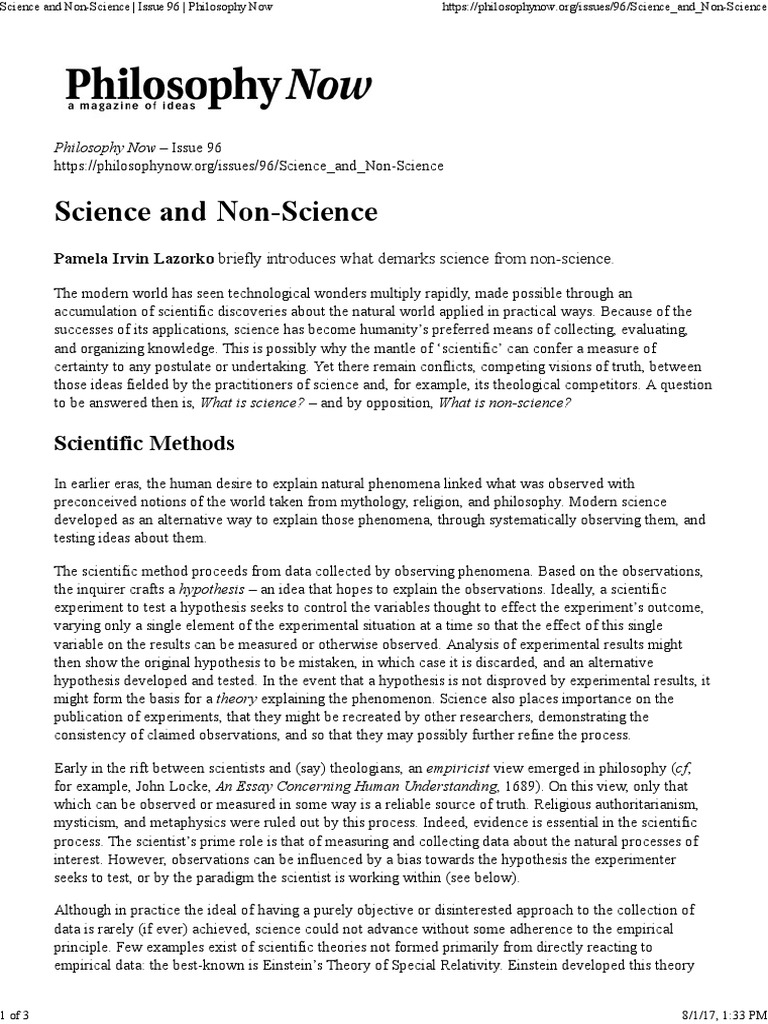In the vast realm of scientific inquiry, mathematics has secured its place as an indispensable ally. However, the intriguing notion of a non-mathematical science invites contemplation. What would such a paradigm entail? Can one embark on a scientific journey devoid of mathematical frameworks, relying instead on qualitative assessments and narrative explorations? This essay endeavors to delve into the potential for the creation of a non-mathematical science, expounding upon the implications, possibilities, challenges, and the philosophical underpinnings that such a pursuit inherently invokes.
The crux of scientific methodology rests on observation, experimentation, and the formulation of theories based on empirical evidence. Traditionally, these elements have been underpinned by mathematical constructs—equations that model natural phenomena, statistical analyses that embellish experimental results, and predictive algorithms that forecast future occurrences. While mathematics excels at precision and quantification, an appraisal of the scientific enterprise devoid of numerical intricacies could engender a novel perspective of inquiry, one that emphasizes understanding phenomena through a more humanistic lens.
Consider the qualitative understandings within the social sciences, where researchers often grapple with the intricacies of human behavior and social constructs. Many studies in sociology, anthropology, and psychology employ qualitative methodologies—interviews, case studies, and ethnographies—to parse the complexities of subjective experience. These approaches illuminate the narrative dimensions of human existence, revealing insights that raw data alone may obscure. One might posit that these fields represent existing exemplars of non-mathematical science, where the plethora of data articulates rich, descriptive narratives without recourse to mathematical formalism.
Central to non-mathematical science is the synonymous exploration of phenomena through dialogue and storytelling. This methodology encourages a discourse that prizes relational understanding—how entities interact within their environments. Such engagement may unveil patterns and truths that rigid mathematical formulations frequently overlook. The philosopher Thomas Kuhn’s notion of paradigms suggests that scientific revolutions often arise from shifts in qualitative understanding, challenging the assumption that mathematical rigor is the only pathway to scientific truth.
Nonetheless, the challenges presented by establishing a non-mathematical scientific discipline cannot be underestimated. Critics may assert that non-mathematical science risks succumbing to subjectivity, leading to conclusions that are more anecdotal than factual. This criticism raises crucial questions regarding the replicability and reliability of findings obtained through non-quantitative methods. Indeed, even within qualitative research, there are standardized protocols that bolster the credibility of findings, emphasizing that subjective interpretations must also adhere to criteria of rigor to achieve scholarly validation.
The potential creation of a non-mathematical science necessitates an exploration of its epistemological foundations. The distinction between ‘soft’ and ‘hard’ sciences underscores a qualitative discourse that has long intrigued scholars across various fields. A non-mathematical science could foreground interdisciplinary dialogues that bridge the divide between the humanities and the sciences. It could invite collaborations that draw upon diverse methodologies to enrich understanding and foster innovation. The emergence of transdisciplinary studies exemplifies this movement, where researchers synthesize knowledge from disparate disciplines to address complex global challenges.
One especially captivating area ripe for exploration is environmental science, where the qualitative narratives of indigenous knowledge systems often yield significant insights into ecological sustainability. Indigenous epistemologies challenge conventional scientific paradigms—emphasizing an intrinsic relationship with nature that quantitative data may not capture. By valuing experiential knowledge, non-mathematical science can foster more inclusive dialogue in crafting solutions to pressing environmental issues, ultimately transforming how societies approach conservation and resource management.
Moreover, the interplay between art and science presents another canvas upon which non-mathematical science can flourish. Artists frequently observe and interpret the world through a lens of creativity, challenging established paradigms and inspiring scientific inquiry. Artistic representations can illuminate the visceral experiences of phenomena, fostering empathy and prompting deeper emotional responses. Incorporating the aesthetic dimensions into scientific exploration could yield insights on human perception, providing fertile ground for a scientific paradigm that transcends traditional boundaries.
Additionally, one cannot overlook the role of technology as a catalyst for reimagining the contours of science. The advent of big data provides a rich tapestry from which non-mathematical methods can arise. Innovative data visualization techniques enable researchers to interpret complex datasets through artistic representations, allowing for a qualitative understanding of information that might otherwise remain obscured. This intersection of technology and qualitative research can create new opportunities for engagement with data, thus expanding the horizons of scientific inquiry.
In synthesizing these diverse strands, the notion of a non-mathematical science encompasses an expansive tapestry of inquiry that invites deeper perspectives. Although challenges abound, such as maintaining rigor and validity, the promise of enriching our understanding of the world through qualitative lenses holds profound significance. As science continues to evolve, embracing a broader spectrum of methodologies will undeniably lead to innovative discoveries and foster a societal understanding that transcends pure empirical analysis. The possibility of creating a non-mathematical science not only piques curiosity but also portends a more holistic appreciation of the myriad ways in which knowledge can be cultivated. In this light, the symbiotic relationship between quantification and narrative emerges as an essential dialogue, heralding a future where the realms of science and the humanities intertwine to address the complexities of our existence.












